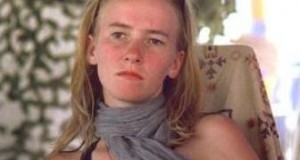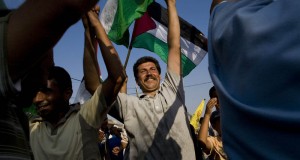24 November 2010 | Popular Struggle Coordination Committee The Road in the village of Qarawat Bani Hassan was paved in Area C on lands marked for takeover by settlers from the adjacent outpost. Construction of the road was funded by ...
Read More »Israeli forces arrest son of jailed Bil’in activist in night raid
23 November 2010 | Popular Struggle Coordination Committee At 2:30 AM this morning Israeli forces entered the village of Bil’in in armored military jeeps and by foot, and proceeded to surround the home of jailed organizer, Adeeb Abu Rahmah. A ...
Read More »Military judge orders to keep Bil’in organizer jailed
22 November 2010 | Popular Struggle Coordination Committee Abdallah Abu Rahmah Abdallah Abu Rahmah was scheduled to be released from prison last Thursday, after having served the one-year prison term he was sentenced to. He remains in jail after the ...
Read More »Israeli soldiers detain five Palestinian Schoolboys in South Hebron Hills
21 November 2010 | Christian Peacemaker Team At-Tuwani – Claiming that the children were throwing stones, Israeli soldiers detained five Palestinian schoolboys. Since the beginning of 2005, the children from the village of Tuba wait every morning for an Israeli ...
Read More »Action Alert: Tell your MP that war criminals should be prosecuted not welcomed!
4 November 2010 | Palestine Solidarity Campaign Yesterday, the Foreign Secretary William Hague reiterated the government’s commitment to urgently resolve the “unacceptable situation” with regard to universal jurisdiction during his visit to Israel. The coalition government want to change the ...
Read More »Israeli Military’s negligence exposes schoolchildren to Israeli settler threats
25 October, 2010 | Christian Peacemaker Team On the afternoon of Monday October 25th, Palestinian schoolchildren from the villages of Tuba and Maghayir al Abeed were threatened by four adult Israeli settlers from the Havat Ma’on outpost while walking home ...
Read More »ALERT: Call for Gaza volunteers falsely attributed to the International Solidarity Movement
25 October 2010 | International Solidarity Movement FOR IMMEDIATE RELEASE Recently an article titled “We are looking for the next Rachel Corrie” appeared on several IndyMedia websites purporting to be an official ISM call for volunteers in Gaza. This article ...
Read More »Bulldozer driver testimony underscores lack of transparency in Corrie trial
23 October 2010 | Rachel Corrie Foundation Voice behind screen says soldiers don’t stop work. Haifa, Israel – The bulldozer driver who struck and killed Rachel Corrie in March 2003, in Rafah, Gaza, testified for the first time Thursday in ...
Read More »Operation Dove: South Hebron Hill Settlers attack Palestinian boy and internationals
21 October 2010 | Operation Dove At-Tuwani – On Thursday, 21st October, at around 9.20 am, two Operation Dove volunteers, coming back to the village of At-Tuwani after having visited some Palestinian families in the village of Tuba, were attacked ...
Read More »Bil’in organizer sentenced to 18 months
21 October 2010 | Popular Struggle Coordination Committee Adeeb Abu Rahmah, a protest leader from Bil’in, was sentenced to 18 months imprisonment by the Military Court of Appeals, for his involvement in organizing demonstrations. The decision dramatically aggravates the one-year ...
Read More » International Solidarity Movement Nonviolence. Justice. Freedom.
International Solidarity Movement Nonviolence. Justice. Freedom.

